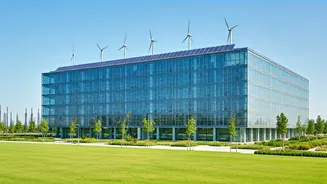Defining Sustainable Economies
Sustainable economies are those that prioritize environmental protection, social equity, and economic viability. They aim to reduce carbon footprints,
promote resource efficiency, and ensure inclusive growth. These economies focus on long-term prosperity by balancing economic progress with environmental stewardship and social well-being. This involves a shift towards renewable energy, sustainable agriculture, and responsible consumption, to create resilient and thriving societies. Furthermore, governments and businesses adopt policies that support sustainable practices, fostering innovation and creating new job opportunities. The goal is to build a future where economic activities benefit all, without compromising the planet's resources or future generations' opportunities. India is actively working to incorporate sustainability principles across sectors.
India's Sustainability Journey
India's dedication to sustainability has been evident through various policies and initiatives. The nation has been investing heavily in renewable energy sources like solar and wind power, with a commitment to increase the share of renewable energy in the power generation mix. Alongside this, India is promoting electric vehicles (EVs) to curb air pollution and reduce reliance on fossil fuels. Initiatives like the Swachh Bharat Abhiyan (Clean India Mission) have also been integral, emphasizing waste management and sanitation to improve environmental conditions. Moreover, India is focused on sustainable agriculture, promoting water conservation and soil health. These coordinated efforts reflect India's strategy to become a more sustainable economy, creating a balance between economic expansion and environmental protection and fostering resilience for the future.
Key Sustainability Indicators
Evaluating an economy's sustainability involves examining several key indicators. Carbon emissions per capita is a major factor, reflecting the environmental impact of economic activities. The proportion of renewable energy in the energy mix is another critical measure, showing the transition towards cleaner sources. Resource efficiency, including water and energy usage, highlights how effectively resources are managed. Waste management practices, such as recycling and waste reduction, play a significant role in reducing pollution. Environmental protection policies and investments in green technologies are also crucial indicators. Furthermore, social equity is vital, measured through factors like income equality and access to essential services. These indicators collectively provide a comprehensive view of an economy's sustainability performance, allowing for assessments and comparisons between different nations and regions to track improvements.
India's Ranking Revealed
The exact ranking for 2025 is not known, but the article reveals India's position in the top 10 sustainable economies. This signifies a recognition of the country's efforts and achievements in promoting sustainable practices. The exact details of India's ranking will show where it stands compared to other nations, with aspects like environmental performance, economic viability, and social well-being considered. The specific rank could reveal India's strengths and areas needing improvement, serving as an important benchmark. Moreover, knowing India's ranking offers insights into its sustainability journey, encouraging it to enhance its policies and practices further. It showcases the progress made and offers an inspiration to further efforts towards a sustainable and prosperous future for the nation.
Comparing to Global Leaders
Comparing India's sustainability performance to other leading economies provides insights into different strategies and outcomes. The US, with its economic scale, faces challenges in reducing carbon emissions. The UK, known for its environmental policies, has implemented various initiatives. China, a major industrial power, is focusing on renewable energy and reducing pollution. Comparing these nations highlights their different approaches to sustainability, affected by their economic structures, environmental policies, and social priorities. Analyzing their performances reveals best practices and offers valuable lessons. India can learn from these global leaders, adapting and enhancing its approach to sustainability. This comparison helps India refine its plans to foster long-term growth and environmental sustainability, ensuring a brighter future.
Challenges and Opportunities
While India has made advancements, it faces sustainability challenges. Rapid industrialization and urbanization create pressure on resources and the environment. Overcoming these challenges requires implementing strong policies, increasing investments in sustainable technologies, and educating the public. There is a huge opportunity for India to become a global leader in sustainable innovation and creating green jobs. By leveraging its resources and technological advancements, India can improve resource efficiency and reduce pollution. Embracing circular economy models, promoting green finance, and encouraging sustainable practices can further support its sustainability goals. Prioritizing sustainability not only safeguards the environment but also boosts economic growth, attracts investments, and improves the quality of life for its citizens. India can transform these challenges into opportunities for growth and establish itself as a prominent, sustainable economy.
Future Outlook and Goals
The future of India's sustainable economy looks promising, with ambitious goals and plans underway. The country aims to increase its renewable energy capacity, expand the use of electric vehicles, and improve waste management. The government is focused on implementing stricter environmental regulations and promoting green technologies. Encouraging sustainable practices across all sectors, from agriculture to manufacturing, is a priority. India's commitment to the UN Sustainable Development Goals further strengthens its resolve for a sustainable future. Collaboration between the government, businesses, and citizens is vital to achieving its sustainability objectives. Investing in research and development, fostering innovation, and educating the workforce about sustainable practices are critical components. Through this comprehensive approach, India can create an economy that is both resilient and beneficial for both its people and the environment.













